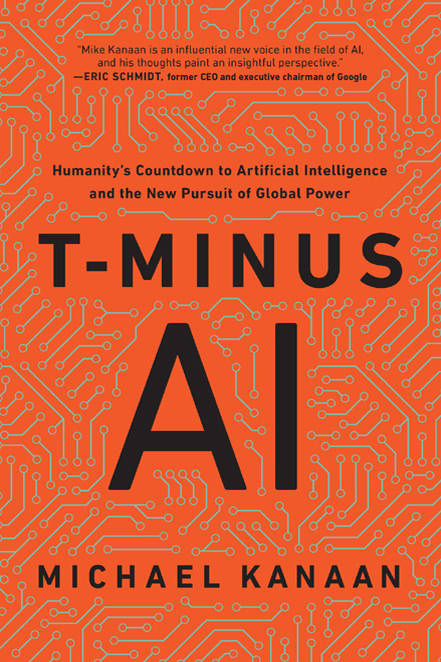Michael Kanaan’s “T-Minus AI” is written for a national security-focused crowd that often hears about Artificial Intelligence (AI) but doesn’t really know about AI and Machine Learning (ML). However, it’s also a book which clearly links the importance of AI to strategic issues, including China’s Belt and Road Initiative (BRI) and the Chinese goal of AI superiority by 2030. As the enterprise lead for AI and Machine Learning for the US Air Force, Kanaan won praise as a Forbes 30 under 30, and explains the American Joint AI Centre’s (JAIC) role in being the focal point of Defense AI strategy.
Kanaan briefs frequently about AI, engages in a lot of conversations about the future of AI, and hears a lot of misconceptions. He writes, primarily, to bring those conversations to a clear, credible and recent context, starting with the 2017 speech by Putin that acknowledged the power of AI.
Although there are many other books on the topic of AI, “T-minus AI” is a great read because of its recency, credibility and trajectory. Not only should you read it because of who the author is but because of who else will read this book and how they will be steered by it ideas (namely the US Defense community).
There’s a nice irony to begin the book. Kanaan confirms that the countdown to AI is over (hence the title) and he goes over the usual concerns people have with AI. There’s a divergence in chapters two and three to tell the story of human history a la Yuval Noah Harari, leading to the origins of modern computing in chapter four. A short primer on the origins of computer languages follows the story of the German Enigma, and Turing’s work, during the Second World War. Part 2 is about 21st century computing and bringing the Kasparov-Deep Blue and Lee Sedol-AlphaGo moments to life. Neural networks are explained, and Kanaan transitions from talking about robots to virtual bots.
Perhaps Part 3 is the most important part of this book for a national security audience – even if you don’t get a grasp on Part 1’s basics, “The Sovereign State of AI” links national security with AI: China gets its own chapter inclusive of nation states that have benefited from its technological exports. Russia follows, and Kanaan contrasts these chapters with American, EU, UK, French and Canadian government policy approaches on AI. Chapter 15 finishes with readers directed to the ‘Technology Roadmap’ in a short passage for Australian initiatives.
For junior leaders, there are three main benefits you’ll gain out of reading “T-minus AI”. It:
- Provides a common language when discussing AI and ML, as well as understanding where the US Defense department is going with AI trajectories.
- Serves to inspire ideas about how AI and ML will change the future of war.
- Links you to initiatives, people and ideas that are worth following in the US Department of Defense because of their talent and potential.
One example of these junior leaders includes US Air Force Flight Commander Roshina Carter, who works as the AI Integration Commander between the US Air Force and MIT AI Accelerator. Carter’s story of commissioning, after gaining a Computer Science degree, is an inspiration to any soldier or officer in supporting their nation’s AI interests.
U.S. Air Force Flight Commander Ronisha Carter is charting an uncommon flight path in AI. Her work could help solve complex logistics and scheduling problems in the civilian world.
— deeplearning.ai (@deeplearningai_) August 27, 2020
We got a chance to catch up with her. Check out her story: https://t.co/hpdWbaVhC0@USAF_AI pic.twitter.com/wokfpHctNk
Kanaan joins the ranks of Elsa Kania and Paul Scharre who are relatively young, serving or former American military officers. They write articulately in the intersection of AI and military affairs, and challenge the reader to be more aware and engaged with the influences of AI at scale. The book’s release is well-timed, ahead of this week’s Joint AI Centre’s 2020 AI Symposium and Conference which you can attend online. You can also find interviews with Kanaan like this one, or view the recent book talk with CSIS’s International Security Program.
About the Author:
Jacob Choi is posted as SO3 Artificial Intelligence at Army’s Robotics and Autonomous Systems (RAS) Implementation and Coordination Office (RICO) within the Future Land Warfare Branch at Army Headquarters. He is studying a Masters of Applied Cybernetics as part of the 2020 3Ainstitute cohort at The Australian National University. Views written above are his own and do not necessarily reflect those of Defence.

